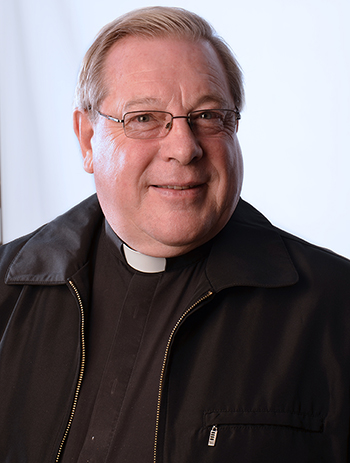
Father Patrick Towe |
The senior leadership of the University of the Free State (UFS) is deeply saddened by the passing away of Father Patrick Towe on Wednesday 6 May 2015, following a period of illness. Father Towe served as Chairperson of the university’s Campus Ministries Forum (CMF) for several years, and had been its representative on the UFS Council since 2006.
“Father Towe was an extremely valuable member of the UFS Council. His insight into and knowledge of university business always contributed greatly to the spirit in which the deliberations of Council took place. He will be dearly missed. Our deepest condolences go to his family, friends, the students of ACTS, as well as the congregation in Heidedal, which he served,” said Judge Ian van der Merwe, Chairperson of the UFS Council.
“I remember Father Towe fondly for his pastoral availability to staff and students during moments of crisis from the time of the Reitz incident to those times in which we lost precious student lives. He would call us to prayer and consolation, and for these gifts from Father Towe I am deeply, deeply grateful,” said Prof Jonathan Jansen, Vice-Chancellor and Rector of the UFS.
Father Towe, OMI (Missionary Oblates of Mary Immaculate) represented the Association of Catholic Tertiary Students (ACTS) on the Campus Ministries Forum. As Student Chaplain, he served the university student body through the Catholic Christian Ministry, providing spiritual guidance and support. He took up campus ministry in Bloemfontein in November 2002, and developed a quasi-parish within the student communities on campus.
He received his education in the United Kingdom where he was ordained in 1975. Throughout his career, Father Towe had a special involvement with community development and youth work. He worked as the Roman Catholic Chaplain at the University of Southampton from 1996 to 1998, providing pastoral care to both students and staff of the university. He served as Parish Priest of Christ the King in Heidedal, Bloemfontein.
“Father Towe was instrumental in reviving the CMF, and getting many more churches on campus involved. He had a heart for seeing churches with different backgrounds and focuses unite in making a difference at the university. He was a true gentleman, and was willing to listen to and negotiate with people, without compromising his values. He also did great work among the people of Heidedal towards the end of his life, and we will miss his presence on the CMF”, said Pastor Alistair Kingwill, current Chairperson of the CMF.
Media Release
Lacea Loader
Director: Communication and Brand Management
Tel: +27(0)51 401 2584
E-mail: news@ufs.ac.za